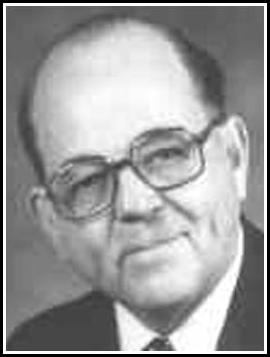
Eulogy for
Roy L. Whistler
Presented by Betty Suddarth
Given at Rotary Club March 2, 2010
Roy Whistler, who died on February 7, would have been 98 years old on
the 31st of this month. Newer members of Rotary probably don't know
much if anything about him. You may have read in the Journal and
Courier about his many accomplishments and awards during his
lifetime. He was clearly a bright, energetic and successful
distinguished professor. Today I'd like to give you a little
additional picture of this remarkable man.
Roy's mother died when he was a baby. When he was around two years
old, his father took him to his grandparents in Tiffin, Ohio. Roy
was raised by his paternal grandparents and he always considered them
his parents. They lived on the edge of the Sandusky River and even
though poor, Roy enjoyed days on the river with his friends which
probably was the start of his interest in nature. Roy also was born
with a cleft palate which was not corrected until he was in his
teens. This condition did not seem to stop or discourage him. He
worked at various jobs but mainly in a grocery store where he did all
kinds of tasks and met lots of community members who became friends
of this very out-going young man. Roy attended the local college,
Heidelberg, living at home and working. After graduation, he was
able to attend Ohio State for a master's degree and Iowa State for a
PhD. Roy launched his successful career with a post doctoral
appointment with the National Bureau of Standards, and then became
the head of the USDA Northern Regional Research Lab in Illinois. He
came to Purdue in 1946 as an assistant professor of biochemistry.
West Lafayette was his home from that time until his death last month.
He joined the Lafayette Rotary Club in 1949 and was the president of
the club in 1963. He attended and participated regularly until
failing health prevented him for the last few years. One of his most
colorful participations happened at the Rotary Park which was north
of Lafayette. Lots of Rotary and community activities occurred
there. The Rotary club had numerous outings there and at one point
in time they had trap shooting contests. Roy was a very skilled
marksman. He liked to hunt and often went hunting for duck, pheasant
and so on with his friends in agriculture. I think even Mauri
Williamson and he had a few outings. Anyway, as Bob Verplank
recalls, when Rotary had their shooting matches, Roy nearly always
won. Years after, Roy talked about the fun they had.
Roy also liked to travel. As well as traveling for pleasure, he had
many opportunities to travel because of lecturing, attending
conferences and consulting. He actually traveled all over the world
and was on nearly every continent. He particularly loved Africa and
was there many times. Earlier he was involved in big game hunting
which later turned into photography trips instead. He loved nature
and wildlife and as a result established the Roy L. Whistler
Foundation in 1997. The foundation is dedicated to the preservation
of natural land and wildlife, and the support of other organizations
that further these purposes. Several Rotarians have been members of
this board. Grants have been given to many organizations. Among
them, NICHES, Tippecanoe County Parks and Recreation Department for
the Celery Bog and Heritage Trail, Wildcat Creek Foundation and
others. NICHES honored Roy by naming a property near the Granville
Bridge the Roy Whistler Wildlife Area. Roy was able to attend the
dedication and was very touched by this recognition.
Roy was also active in the University Senate and was the Faculty
Representative for Intercollegiate Athletics for many years. As
such, he attended most games, both at home and away. He only stopped
going to home basketball and football games a few years ago.
When Roy turned 65, Purdue had a mandatory retirement age. Even
though no longer on the payroll, Roy went to the office nearly every
day, conducted research and supervised post-doctoral students until
he was in his 90's.
One of the most remarkable things about this remarkable man was his
optimism. He always said, "Research scientists have to be optimistic
because they have so many failures. They have to believe the next
experiment will be successful." That explains part of it but there
is a trend here that goes back to childhood - overcoming hardships
and obstacles, supporting himself through college but being
optimistic through it all. He was probably the most optimistic
individual I have ever met. It contributed positively to his life
his entire 97 years. Even when his health was failing and you asked
him how he was, he would smile and say "Fine".
This man, with a building, research center and professorial chair
named for him, numerous awards including four honorary degrees,
numerous graduate students and post docs around the world who studied
with him, is still remembered by a Rotarian friend as "this kind and
gentle man". Let's remember him that way too.
